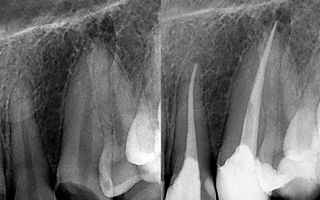Endodontics (root canal)
Loo🌞king after the health of the soft tissues inside yo♒ur teeth.

Endodontics is a specialist type of dentistry that fo⛦cuses on the soft pulp in the roots of your teeth.
This pulp is essential for the development of each tooth, and once the tooth is fully grown, the pulp tends to decrease in size. Normally, you won’t ever neeღd to think about this soft tissue in your tooth roots, but should it become inflamed or infected, your dentist may perform a root canal treatment.
That’s why endodontics is so often synonymous with root canals, and why it’s such an important part of dentistry i♓n keeping your 🏅teeth healthy.
What is endodontics?
Endodontics invo💞lves looking at the soft tissue inside the tooth. This includes the r🤪oot of each tooth, the pulp inside the tooth, as well as the nerves and surrounding tissue.
Ideally, you’ll never have to think about this part of your tooth, but it is possible for these soft tissues to become infected, or even die off. Wheꦇn thওe pulp becomes infected like this, it is known as pulpitis, and some mild cases can be reversible with care and medication, but severe cases are irreversible.
When this happens, it can result in severe dental pain and sensitivity. You will likely notice very quickಌly and will need to make an immediate appointment with your dentist.
Usually, these infections occur due to tooth decay and cavities. Normally, your dentist will give you a dental filling to repair ☂these cavities, but if the decay is too close to the nerve, or goes into the nerve, further treatment may be required. Other causes include fractured teeth and injuries.
For cases of irreversible pulpitis (when the nerve of the tooth is irreversibly inflamed from decay or trauma), it is likely that your dentist at Na𓃲tional Dental Care Newstead will recommend a root ca🎃nal treatment.

What is a root canal?
A root canal is the name of a t🦹reatment that repairs the damaged soft tissue inside a tooth. This soft tissue is known as the dental pulp, and is composed of connective tissue, nerves, and blood vessels. Together, this tissue helps the tooth to grow.
Sometim🐼es, this tissue beco🅺mes damaged. It could be that the nerve dies, there is physical trauma to the tooth, an old filling fails, or perhaps gum disease causes the damage. Whatever the reason, damage to this pulp can be extremely painful, so it is usually very obvious to the patient that something is wrong.
This treatment will remove the damaged pulp and replace it with dental filling. The good news is 𓆉that the pulp is no longer necessary iꦉn adult teeth because it has already completed its task of helping that tooth to grow, however the filling will replace the pulp to retain the strength and health of the tooth.
What is an Endodontist?
An Endodontist is a dentist with additional skills and training in༒ endodontics. This means they know how to examine and treat problems relating to the soft tissues inside your tooth.
The majority of an ꦓEndodontist’s work involves performing root canals, where they remove the infected or dead soft tissue inside a to✤oth and replace it with a permanent filler.
While a dentist may do the occasional root canal, amongst other work such as fillings and cleanings, an Endodontist will spend much more time doing root canals. They will often work on difficult cases where the cause of pain isܫ difficult to ascertain, or where a root canal is especially complicated or challenging.
T♍o see an Endodontist, you will usually need a referral from your general dentist at National Dental Care Newstead.

What are the advantages of receiving endodontic treatment?
There are multiple key benefit♔s to receiving endodontic treatment such as a root canal:
- Remove the source of pain: When the pulp in your tooth becomes infected, it can be extremely painful. Having a root canal treatment removes the source of that pain.
- Save your natural tooth: Without a root canal, the infection in the soft tissue in your tooth can get worse, and you could lose your natural tooth.
- Avoid more invasive treatments: Despite its bad reputation, a root canal is akin to a large filling. However, without one, you may end up needing a dental implant or other tooth replacement procedure, which is more invasive than a simple root canal.
If your tooth is causing you pain, it’s important to have it checked by a dentist and determine the ‘root’ of the issue so you can fix it, maintain the health of your teeth, and get back to living life 🐲to its fullest.
Get in touch with our friendly team at National Dental Care Newstead today to schedule an a𝄹ppointment.
Frequently asked questions
A root canal treatment in Australia depends on a number of facto✅rs, such as how many canals the tooth has (oಞne canal makes for a simpler and faster procedure than a tooth with four canals), and whether you need additional appointments or sedation.
You may also need to factor in the cost of getting a dental crown, as this is an important follow-up to m൩ost r♒oot canals and can add an additional cost.
If you need financial assistance for your treatment, we offer an exclusive interest-free payment plan called SmileFund. With SmileFund, you can undergo your dental treatment and pay it off over tiܫme.
Yes, absolutely. Anyone who knows the pain of a soft tissue infection or the nerve dying inside the tooth knows just how worthwhile a root canal is. Not only does this treatment rid you of what can be severe dental pain, it also prevents the infection spꦉreading further, and helps to preserve your natural tooth and avoid further dental treatments that you would need to replace it.
A dentist and an Endodontist have the same basic training and skills, but an Endodontist specialises in treatment of the soft tissues in the teeth. That’s why an Endodontist will often perform complicated root canal procedures or other treatments th🥀at involve the soft tissue in the tooth.
The most common procedure that an Endodontist performs is a root canal, but they can also fix cracked teeth, place dental implants, do root canal re-treatments, root end surgeries, and anything else relating to the soft tissue inside you♐r tooth.
Sometimes, your dentist may not have the additional training or knowledge they would need in order to perform a treatment. This is most often the case fౠor complicated root canal treatments, but your dentist at National Dental Care Newstead may also send you to an Endodontist for other procedures, such as fixing an old root canal or placing a dental implant.
